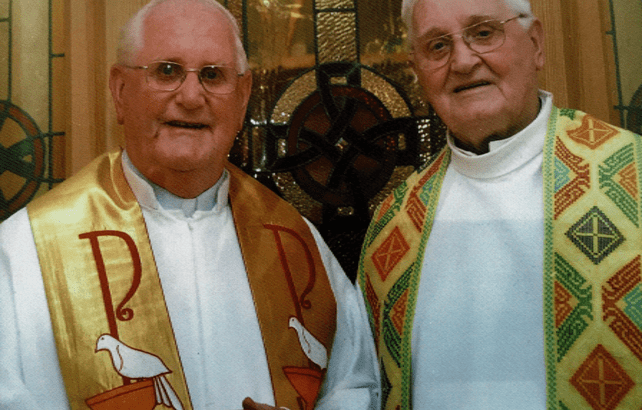Personal Profile
The Philippines has one of the largest Catholic populations in the world – a country of more than 100 million people, of which 80% are Catholic and 90% are Christian. This is the legacy of missionaries from the 1500s down to today – missionaries such as Fr Donal Bennett of Omagh, who spent forty years ministering to the Filipino population.
Fr Bennett grew up, as many other Irish men and women in the 1940s and 1950s, within a Catholic culture. He attended Mass regularly, sung in the Church choir and joined the Legion of Mary. He attended Catholic primary and secondary schools, although he was a late graduate, having dropped out to work with his father.
The Columban fathers were there, who planned the diocese and even the incoming bishop was a Columban called Harry Burns”
Then by the age of 20, he and a friend decided to hitchhike their way across England, heading south and crossing over into France. They spent time at Lourdes, where they had a great time, he says, dancing and taking part in all the local ceremonies.
“The following November I had this inclination or thought that I should be a priest,” Fr Bennett tells The Irish Catholic. “When I mentioned this to my parents they said, ok, ok. Then I applied into the Columban fathers central house in Dalgan Park, Navan and was told that they’d accept me alright but I’d need a grammar school certificate of some kind.”
So Fr Bennett returned to school for a year and received his GCSE. He entered Dalgan Park in 1954 and in December 1960, he was ordained to the priesthood. A year later, he went to the Philippines.
“The Columban fathers had been given a civil province called Zambale which we later got turned into a prelature and into a full-blooded diocese,” Fr Bennett says. “The Columban fathers were there, who planned the diocese and even the incoming bishop was a Columban called Harry Burns. I was given time to learn the language which is called Filipino or Tagalog. I was assigned to various parishes over the next 30-40 years, all of which was quite an experience.”
Welcoming
Fr Bennett found the Filipino people to be very welcoming: “They had to go through an awful lot under the Spanish, the Americans, the Japanese and then the Americans again. Through it all, there were all kinds of mix-ups in religions and churches and so on. We were given this particular diocese because it was very much in need of renewing and bringing local Filipino vocations which was one of the jobs I was assigned to in my early years. Thank God that down through the years, by 2000, there were enough priests and local clergy to take over – mission accomplished as far as we were concerned.”
Fr Bennett worked in the Philippines in a time of great turmoil following the imposition of martial law in the 1970s. Much of his work, he says, was focused on “promoting basic human rights, justice and Christianity”. They achieved this through building Christian communities and churches, particularly in poor communities and slums.
“In most cases that was not too hard, people were ready and willing to participate in the running of their own parish and their own church,” Fr Bennett explains. “A lot of that was through the area of basic Christian communities. Then the youth angle of that, in many parishes I had a very strong youth organisation who definitely got into the spirit of the thing. Many of them had no work, they were aged say 16-24, that sort of thing.
“The whole lot of it was a choice to be able to work with, through and in all these little groups of churches and Bible studies and Bible enactments. What I mean by that is putting the teachings of the Bible into their every day life. It’s hard to gauge the success of something like that, but I think the Lord was happy enough with what we were doing!”
Missionary home
The Omagh priest returned to his home town in the year 2000 to find Ireland and his local community much changed. He took a year’s sabbatical working in the missionary home at Dalgan Park. “I was no spring chicken myself,” he jokes. “I was assigned as the director of that nursing home, which was sometimes difficult, but mostly a rewarding or happy job to have.”
After that, he was assigned to work with migrant Filipinos in Northern Ireland, which he also found to be rewarding work: “They still call me and ask me for various things you know,” Fr Bennett says. “A lot of the migrants, most of whom are nurses, departed for England or Scotland in order to get a better wage. But my experience with the Filipinos here in Northern Ireland was rewarding also, they were happy that there was somebody taking an interest in them.”
Fr Bennett believes that Ireland is mission territory and hopes that parishes and diocese will be open to inviting priests from Poland, the Philippines and Latin America to help revitalise the Irish Church.
“The Elphin diocese have definitely brought in foreign priests to their diocese and then there are some in Derry diocese,” Fr Bennett says. “I can’t comment on other dioceses and whether they are acknowledging the fact – and it is a sad, sad fact – that Ireland is now a mission territory. There are countries like Poland and the Philippines, African countries as well, who would be willing to be asked to come in and help with the situation which is pretty dire at the moment.”


 Ruadhán Jones
Ruadhán Jones Fr Donal Bennett (L) with his brother Terry on their 50th
and 60th Anniversaries for their ordination in 2010.
Fr Donal Bennett (L) with his brother Terry on their 50th
and 60th Anniversaries for their ordination in 2010.